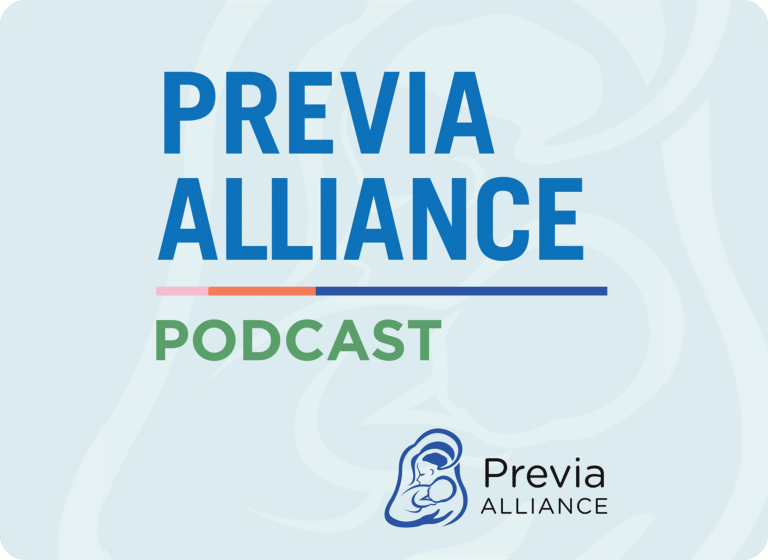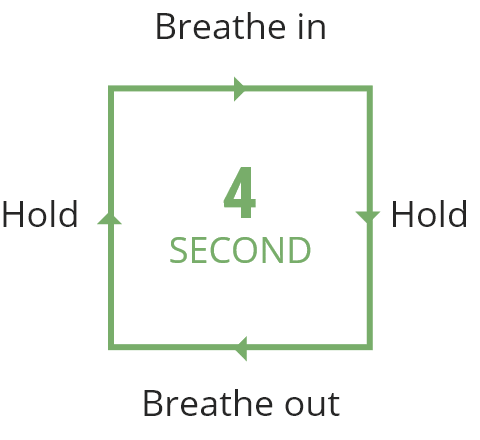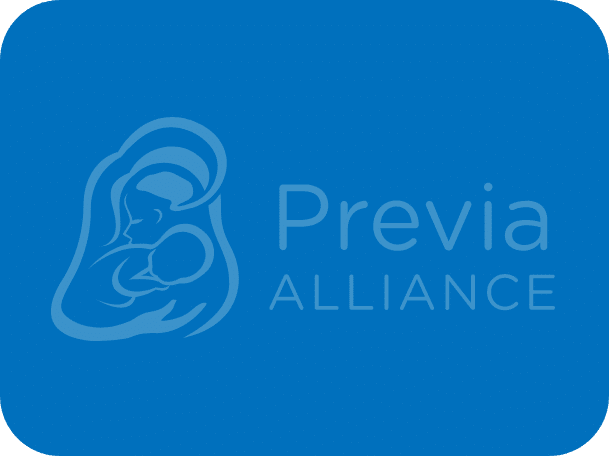Spotlighting Maternal Mental Health
It is universally acknowledged that motherhood is difficult. What isn’t acknowledged is the fact that a mother’s mental wellness is a contributing factor to the long-term well-being of herself, the child, the family, and society.
May is designated as Maternal Mental Health Awareness Month. The goal is to draw attention to the risks and implications of mental health problems before, during, and after pregnancy.
May is designated as Maternal Mental Health Awareness Month. The goal is to draw attention to the risks and implications of mental health problems before, during, and after pregnancy.
Storytelling Saves Lives
We asked Previa Alliance moms and allies to share their experiences with mental health challenges during pregnancy or postpartum.
Listen to More Stories and Join the Conversation.
Together, we can save a lot of heartache and suffering.
And possibly a life.
Download and Share the Previa Alliance Podcast


Maternal Mental Health Facts
Perinatal mood and anxiety disorders (PMADs) include a range of disorders and symptoms, including depression, anxiety, and psychosis. These disorders and symptoms can occur during pregnancy and/or up to a year after giving birth (postpartum). If left untreated, these disorders can have harmful and long-lasting impacts on the mother, her baby, the family, and society.
We asked Whitney, our maternal mental health therapist, to summarize the signs and symptoms of a few of these disorders.
Preventing and Treating Perinatal Mental Health
Previa Alliance’s mission is to encourage women to talk about what they are feeling during pregnancy and postpartum. Two things can be true: Becoming a mother is wonderful, and being pregnant/being a mother is difficult, anxiety-inducing, and sometimes depressing. The more we acknowledge these truths and encourage women to talk about their feelings, the more likely it is that women can get the help they need.
There are several ways to prevent and treat perinatal mood disorders. First, though, you need to know your risk factors and symptoms associated with mood disorders. Then, be willing to talk and create a plan to respond to it. You can also download this infographic to share with friends and family.

Know Your Risk Factors
• History of Depression and/or Anxiety
• Lack of Support and/ or Resources
• Family History of Mental Illness
• History of physical and/or sexual abuse
• Unwanted and/or unplanned pregnancy
• Currently under stress

Know the Symptoms
• Feelings of guilt, shame, or hopelessness
• Crying; constant worrying
• Pounding heart; difficulty taking a deep breath, can’t sleep/eat
• Feelings of rage, anger; having scary or unwanted thoughts

Have a Plan
• Let your partner, family and friends know how you’re feeling
• Talk to your provider and discuss treatment options
• Talk to a mental health therapist/ counselor
Get Help
National Maternal Mental Health Hotline Available 24/7
833-852-6262
(English & Spanish Counselors and Interpreter Services Available)
Suicide & Crisis Lifeline Available 24/7
Call or Text 988 or visit
988lifeline.org to Chat
Línea de Prevención del Suicidio y Crisis
1-888-628-9454
Lifeline Options For Deaf + Hard of Hearing
For TTY Users: Use your preferred relay service or dial 711 then 988.
Postpartum Support International
Non-emergency helpline
Call/Text 800-944-4773
(English and Spanish Counselors)
833-852-6262
(English & Spanish Counselors and Interpreter Services Available)
Suicide & Crisis Lifeline Available 24/7
Call or Text 988 or visit
988lifeline.org to Chat
Línea de Prevención del Suicidio y Crisis
1-888-628-9454
Lifeline Options For Deaf + Hard of Hearing
For TTY Users: Use your preferred relay service or dial 711 then 988.
Postpartum Support International
Non-emergency helpline
Call/Text 800-944-4773
(English and Spanish Counselors)
important
If you are having thoughts of hurting yourself or your baby,
go to the Emergency Room or call 911.
Protecting Your Mental Health
We want moms to know that perinatal mood disorders are common and treatable! It is normal to have feelings of sadness and anxiety while also being excited and hopeful when pregnant or holding your newborn. Here are ways you can support and protect your mental well-being.

Identify your support team
What friends or family members are you closest to? Talking with a friend is sometimes enough to help put things into perspective.

Practice self-care
Go for a walk. Take a nap. Get a foot rub. When you start to feel overwhelmed with all the changes, restore balance by taking extra care of yourself.

Breathe
When stress or anxious thoughts cause your chest to constrict, try box breathing.

Be an Advocate
Previa Alliance encourages women and their allies to recognize and champion the importance of maternal mental health 365 days a year.
You can help promote this cause by signing our Pledge that encourages:
• Screening for perinatal mood and anxiety disorders during pregnancy and postpartum
• Learning about PMAD signs and symptoms
• Connecting women to therapy/treatment
• Sharing this information with others
You can help promote this cause by signing our Pledge that encourages:
• Screening for perinatal mood and anxiety disorders during pregnancy and postpartum
• Learning about PMAD signs and symptoms
• Connecting women to therapy/treatment
• Sharing this information with others
Interested in Partnering with Previa Alliance?
We work with medical providers and workplace benefits departments to educate, screen, and help support pregnant and postpartum women.
We work with medical providers and workplace benefits departments to educate, screen, and help support pregnant and postpartum women.


